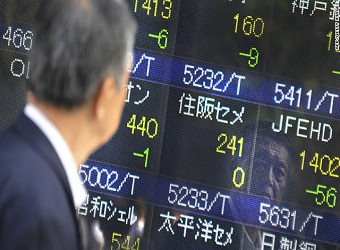The Nikkei 225 rose 1.5 percent, or 317.26 points, in early trade. Most sectors were in positive territory despite the firmer yen, with technology and financials recording substantial gains in the morning. Sony rose 2.03 percent and Mitsubishi UFJ Financial Group was higher by 2.49 percent.
The manufacturing sector also traded higher, with Fanuc Manufacturing and Komatsu climbing 1.83 percent and 4.18 percent, respectively.
The benchmark had come under pressure in the last session after the dollar fell to 15-month lows against the yen during Asian trading hours on Wednesday.
On the data front, Japan’s December core machinery orders fell 11.9 percent, Reuters said — a larger decline than the 2.3 percent median fall projected.
Over in Sydney, the S&P/ASX 200 rose 0.89 percent, with the energy, materials and gold sectors among the best-performing sectors in the morning. Major miners were higher early on: Rio Tinto rose 2.93 percent and BHP gained 3.48 percent. Australian insurer Suncorp fell 2.89 percent after it reported that half-year net profit fell 15.8 percent to 452 million Australian dollars ($358 million), missing a Thomson Reuters I/B/E/S forecast of A$486 million. It cited higher-than-expected natural hazard claims as a factor affecting its earnings.
Australian insurer Suncorp fell 2.89 percent after it reported that half-year net profit fell 15.8 percent to 452 million Australian dollars ($358 million), missing a Thomson Reuters I/B/E/S forecast of A$486 million. It cited higher-than-expected natural hazard claims as a factor affecting its earnings.
Meanwhile, Origin Energy jumped 6.08 percent after the company announced underlying earnings before interest, tax, depreciation and amortization for the first half grew 51 percent to A$1.49 billion ($1.18 billion).
It also raised full-year guidance to a range between A$1.78 billion ($1.41 billion) to A$1.85 billion ($1.47 billion), from a range of A$1.7 billion to A$1.8 billion.
Elsewhere, Hong Kong’s Hang Seng Index rose 1.29 percent in the morning, with the finance, and commerce and industry sectors contributing the most to early gains. Financials were firmly in positive territory, with China Construction Bank up 2.35 percent and HSBC climbing 1.37 percent.
Markets in China, South Korea, Taiwan and Vietnam are closed on Thursday for the Lunar New Year holiday.
Wednesday marked the fourth day of gains for stock indexes in the U.S., with the three major indexes posting gains of more than 1 percent.
Stocks stateside had initially begun the session in negative territory following the release of highly anticipated U.S. inflation data, although they later reversed those losses. The consumer price index rose 0.5 percent last month, topping the 0.3 percent forecast in a Reuters poll.
Yields on U.S. government debt rose following the release of inflation data. The yield on the 10-year U.S. Treasury note jumped to 2.92 percent on Wednesday, its highest levels in four years.
Other economic data released overnight included U.S. retail sales for the month of January, which missed expectations.
In currencies, the dollar index, which tracks the U.S. currency against a basket of rivals, slipped to trade at 88.939 by 9:32 a.m. HK/SIN, compared to Wednesday’s close of 89.006. The overnight decline in the greenback came despite expectations that price pressures would influence the Federal Reserve’s interest rate hike path.
Against the yen, the dollar traded at 106.61 after slipping as low as 106.39 earlier in the session.
Meanwhile, the Australian dollar dipped as low as $0.7905 on the release of January jobs data that met forecasts, but later firmed to trade at $0.7939. That was above levels around the $0.78 handle seen at the beginning of the week.
On the commodities front, oil prices were slightly higher after rallying on Wednesday, on the weaker greenback and a less-than-expected rise in U.S. crude inventories.
U.S. crude futures rose 0.59 percent to trade at $60.96 per barrel after settling more than 2 percent higher overnight. Brent crude futures rose 0.42 percent to trade at $64.63.
Source: CNBC


